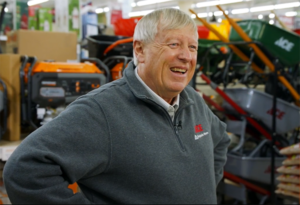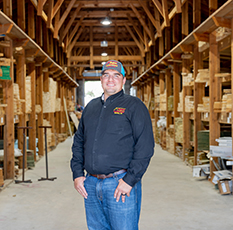Independent Retailers Month Supports Small Businesses
Published: July 17, 2019
Updated: June 27, 2024
What do Harlan Sanders, Mary Kay Ash, Ray Kroc, and Sir Richard Branson have in common? Yes, they’re all business moguls who developed iconic brands. But what many people don’t know is that they all started out as small, independent merchants. Each July their spirit is celebrated with National Independent Retailer Month which encourages everyone to support small businesses.
Sanders hatched his Kentucky Fried Chicken empire by selling fried chicken at a gas station he ran in North Corbin, Kentucky. Ash hocked Stanley Home Products, brooms and brushes, before moving to lipstick and eyeliners, creating her own line of beauty products. Kroc was a traveling salesman before turning the McDonald’s brothers’ San Bernardino hamburger stand into the world’s largest restaurant chain. And Branson began his global conglomerate, Virgin Group, by selling mail-order records out of a local church in southeast England. Of the four, only Kroc had any previous sales experience, which makes their success even more incredible.
“Small” is a point of view
Small businesses are definitely not small potatoes when it comes to employment and commerce in the United States. According to the Small Business Association, there are over 33 million small businesses in the United States, and they make up 99.9% of all U.S. businesses. They employ more than 61 million people, which accounts for 45.9% of all employment in the country.
According to the Small Business Administration, small businesses make up 43.5% of the domestic gross national product (GNP) and 35.6% of all private sector sales, which reach roughly $13.3 trillion.
Small businesses going big on technology
A U.S. Chamber of Commerce Technology Engagement Center study shows that small businesses are leaning on retail technology more than ever to compete and succeed.
93% use at least one technology platform
86% of small business owners say technology helped their business survive the pandemic
83% plan to increase their use of technology platforms
77% of SMB owners say their businesses would struggle to survive without retail technology
Tech helps small business grow, small towns prosper

Jim Byrum uses Paladin technology to run his seven hardware stores in small towns across Central Michigan.
Jim Byrum had a career that included corporate sales and representation of agricultural interests in private, state and federal agencies before he turned into a full-time small business owner by opening a small hardware store in Leslie, Michigan. The store was 4,000 square feet and within a few years it was so successful it had doubled in size and become an important resource for the tiny town.
Similar stories followed for Jim in other Central Michigan communities – Holt, Howell, Stockbridge, Pinckney, Charlotte and Gregory. Most were small towns that had lost their hardware stores or were on the verge of losing them, Jim says.
“Over the last 20, 30 years there’s been a real loss of small-town hardware stores, and the lack of modern technology, I think, is one of the reasons. The demand for technology by retailers for a number of reasons, and the need for speed at the point of sale has changed so much over the past few years, I don’t know how stores operate without it,” he explains.
Jim runs all his stores on technology from Paladin Data Corporation. Paladin Point of Sale handles all his customer service and inventory management. Because the stores are spread out across roughly 80 miles of Central Michigan, he uses Paladin Mobile applications to remotely keep track of them. They each order many of their own products, but Jim says they combine orders on certain shared products.

Byrum Ace Hardware in Pinckney, Michigan
“The store managers have a lot of autonomy. They know their communities. They all live in the towns where they work. We have found that each of the stores has its own quirks regarding product and customer services. We do streamline ordering a lot, though,” he explains, adding that Paladin keeps his stores operating as efficiently and profitably as possible. “Maintaining current retail prices and product costs has been absolutely critical the past few years. The Paladin systems are critical tools to help us accomplish this and maintain our margins and profitability.”
Jim says technology has allowed all his stores to thrive. Four of them – Leslie, Charlotte, Howell and Pinkney – earned 2022 Pinnacle Awards from Ace, while two others were honored as Platinum stores.
Regional studies abound on how supporting small businesses stimulates communities, and America’s heartland is at the heart of many. The South Dakota Rural Enterprise found that a dollar spent at an independent retailer is normally re-spent up to 16 times before it leaves the community.
Another study done by the Indiana Main Street Program shows that only six cents of a dollar spent at a big box store remains in its community. And research done by the Institute for Local Self-Reliance found that every $100 spent at local retailers generates $45 of secondary spending, while a similar investment in a chain store garners just $14.
“I like small towns. Two of the towns – Charlotte and Holt – are a little larger, but most are essentially neighborhood stores,” he explains.
Technology is big for small-town startup

Sam Olson’s enterprise grew from a single hardware store and lumberyard to include separate ranch supply, fuel and propane businesses.
Sam Olson was still at Black Hills State University when he and his parents bought the local hardware store in his hometown of Buffalo, South Dakota. He had to move the store from the Dark Ages into the 21st century.
The previous owner operated with a cash register, pen and paper. So, his first order of business was to update the store’s operating system. He says he studied between “10 and 15” retail systems before choosing Paladin Point of Sale.
“My goal was to make sure we had a system that would take us into the future. We had to have the technology to help us succeed. You don’t change systems every year, so we made sure we made the right decision. Paladin just gives us the data we need,” he explains.
To say it was a success is an understatement. Buffalo Hardware’s sales tripled in Sam’s first year as owner and in 2019 the store notched over $2 million in sales.
That success led to him opening or acquiring three other businesses – Buffalo Ranch Supply, Olson Propane and Olson Fuels – all of which run on Paladin technology. It also earned Sam recognition from the North American Hardware and Paint Association as one of its Young Retailers of the Year in 2020.
His businesses are a huge part of the economy of Buffalo, a town of 350 hardy souls in the northwest corner of the state.
“When you live in a rural community like this you can’t afford to lose a business. We felt we had to step up and do something to keep our small town alive,” he explains.
Simplicity makes technology work for small businesses
All the technology in the world won’t help a small business if it’s not usable. That’s why a user-friendly point of sale is key. It must be easy to learn and use for both store associates and customers to benefit.
“A system with a user-friendly interface makes it easy for anyone, even those apprehensive about using a computer, to become productive after minimal training,” says Dan Nesmith, founder and president of Paladin Data Corporation, a leading provider of retail technology solutions.
Sam attributes some of his store’s success to how easy it was to implement Paladin and teach it to his employees. The system’s simplicity and flexibility won Sam and his employees over.
“We had to overcome an employee fear level – we had some with no computer skills at all. With the touchscreens, having the simplicity of Paladin and the ability to point and click – it seems just about anybody can run it, which was big,” he explains.
Survival of the fittest
Optimistic retailers believe their businesses can offer services that customers can’t find anywhere else. In the AIB survey, independent retailers cite four characteristics of their businesses they see as an advantage over big-box stores and e-commerce:
- Service: Independent retailers provide better and more personalized customer service than chain stores.
- Community: Independent merchants are more intimately involved in their communities. Online retailers don’t even factor here.
- Knowledge: Independent merchants can offer first-hand experience and advice.
- Experience: Local businesses provide more unique and intimate shopping experiences than cookie-cutter chain stores.
Independent merchants also see opportunities in the evolution of the retail industry. Large store closures such as Kmart, Sears, Macy’s and others have left voids in neighborhood markets that many local merchants are seeking to fill.
Independent merchants build character
There are many ways local, independent businesses help communities beyond recycling cash:
Independent businesses give communities their unique character.
Independent business owners are an integral part of the communities in which they live and work and thus tend to recognize how their decisions may impact their neighbors.
Independent business owners help to build a sense of community by providing local jobs, creating entrepreneurship, and sparking innovation and business competition.
That’s another reason why independent “buy local” campaigns are a good idea. According to the American Independent Business Alliances (AMIBA), businesses in communities with long-term “buy local and independent campaigns” reported average revenue growth of 7.4%. That’s nearly twice as much as independent businesses without such support.
Campaign trail
Many chambers of commerce and community-specific small business associations offer campaigns to support small businesses. There are many resources available to independent business owners interested in starting such campaigns.
AMIBA – American Independent Business Alliance offers a guide to a campaign and a roundup of seasonal campaigns.
Association of Chamber of Commerce Executives – offers information and resources on “buy local” initiatives.
National Federation of Independent Business – is an organization dedicated to providing support to small business owners.
Small Biz Survival – is a website dedicated to helping independent businesses that offers an e-book on campaigns.
Upshot
Not every entrepreneur wants to become the next Harlan Sanders, but they all aim for success. Technology can aid that drive for success, and every independent merchant who succeeds helps their community prosper.
brian bullock
Author


